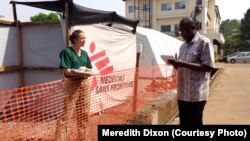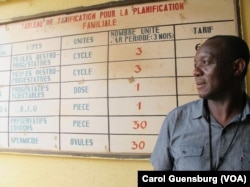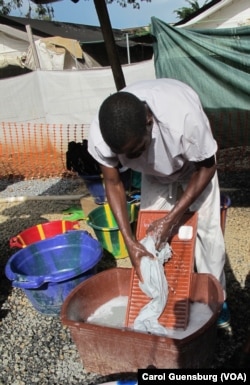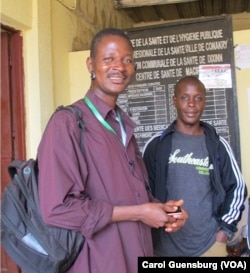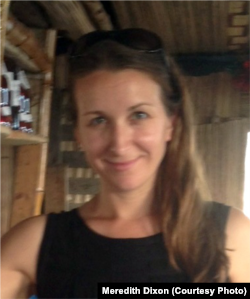A year into an Ebola outbreak that has killed more than 8,000 people in West Africa, resistance still plagues the public health response.
And when a public servant charged with protecting people denies the deadly virus’ existence, it’s especially alarming, said Meredith Dixon, an epidemiologist with the U.S. Centers for Disease Control and Prevention. She was visiting one of Guinea’s western prefectures when a police officer stopped the vehicle in which she was riding. Dixon and her driver explained they’d been traveling for Ebola research.
"The gendarme said, 'There’s no such thing as Ebola,'" Dixon said. "I know, I know – there are people who don’t believe. But to hear it is a little different."
That resistance both challenges and motivates Dixon and other Americans involved in the international effort to combat Ebola. They’re helping local governments – in Guinea, Liberia, Sierra Leone and some neighboring countries – as they try to track, treat and prevent the unpredictable disease.
While dismissiveness gradually has been yielding to rising death tolls and aggressive public awareness campaigns, other obstacles remain. Among them: a general mistrust of outsiders, particularly white people; limited formal education; and poor infrastructure, especially a rickety health care system devastated by years of civil strife and widespread poverty.
Dixon, 36, is among more than 170 CDC staff members in West Africa aiming to expand knowledge about Ebola and how to fight it. Most rotate in for one or two months. Dixon is wrapping up a three-month tour, by far the longest of three trips she’s made to Guinea since the country’s health ministry acknowledged the Ebola outbreak. She was one of the early responders, arriving in April for a month and returning in July for another.
A pediatrician, Dixon has been drawn to West Africa since volunteering with the Peace Corps in Cameroon and Gabon. Now, as an officer training in the CDC’s Epidemic Intelligence Service, she appreciates working among the region’s "kind" and "fantastic" people, polishing her skills in disease detection.
She focuses on health workers and their infection control practices, putting in countless hours in urban field hospitals and remote villages, working with Guinean and international teams, interviewing and encouraging.
Dixon recalled speaking with an infected doctor at an Ebola treatment center. When another patient arrived, moaning from abdominal pain, the doctor turned to offer a few calming words. Despite his illness, "he was still in a role as a physician, providing support to others," she said. "It was a very touching moment for me. … This conversation was one which really made me feel the immensity of this work."
But as the outbreak has dragged on, even some health workers have become complacent or careless. "We have seen, in parts of all three of the countries, health care workers relaxing their grip on the response, not using protective equipment, not thinking of Ebola at every opportunity," CDC Director Tom Frieden said recently.
Still, health experts say they see progress. The transmission rate has slowed in Liberia and even in Sierra Leone, where it has been most intense, though it has fluctuated in Guinea since September. But experts have learned to be wary, especially after missing key cases last spring and mistakenly believing the outbreak was winding down. The World Health Organization, too, has been faulted for delaying the international call to arms and inadequately coordinating aid.
There’s yet another challenge: weariness among West Africans and others working with them to battle Ebola.
"I’m very tired, just like everybody else," said Dixon, who puts in long hours six and sometimes seven days a week. "But we have to keep doing what we’re doing, and doing it better."
Connecting cases
The Ebola virus slips in quietly, going underground as it lays waste to cells, to organs, to lives.
The only way to stop its spread is to find everyone who’s come in contact with an infected person, then monitor them daily for 21 days – the disease’s maximum incubation period. Any sign of fever, nausea, diarrhea or other symptoms should prompt isolation and treatment.
Identifying contacts is a specialty of disease detectives like Dixon and John Ngulefac, another CDC epidemiologist involved in training local teams. Once a police detective in his native Cameroon, he transferred his sleuthing talents to the public health agency. His knowledge of French and West African languages and customs, plus a cool, commanding presence, help elicit information.
Ngulefac, a handful of other CDC investigators, and a community agent followed the killer virus’ trail one autumn morning in this capital city to a walled compound where a person had recently died.
Inside, a slender girl stepped away from several young children playing in the dirt courtyard. Keeping a few meters’ distance from the visitors, she introduced herself as Aminata. The 16-year-old was named for her maternal grandmother, who came to the household with the first signs of her mortal illness.
The younger Aminata told Ngulefac she had helped care for the ailing woman, scrubbing her soiled clothing and bedding. She didn’t wear rubber gloves or other protective gear – risky because the virus is transmitted through direct contact with a sick person’s bodily fluids – but to date hadn’t shown any sign of illness. Nor had anyone else in the household.
Ngulefac posed more questions.
Did Aminata know the cause of her grandmother’s death? Yes, she said, Ebola.
Had that knowledge affected her behavior with friends? She shrugged and shook her head vigorously.
How did she greet her friends? Aminata clasped her hands to demonstrate a handshake. Investigators exchanged uneasy glances; touching has been discouraged during the outbreak.
The teen also established that her grandmother was the sister of an imam, a Muslim leader who’d died earlier of Ebola. That tip – later pooled with information from a local clinic and the nearby Ebola treatment center run by the medical charity Doctors Without Borders – turned up more connections in the transmission chains.
"That was contract tracing like you want," investigator Jon Eric Tongren said later.
Troubling time frame
Later that day, CDC investigators learned the Doctors Without Borders center had admitted seven new patients. Five had been on their contact tracing list.
Ngulefac was troubled that it had taken 18 days of monitoring; community agents may have overlooked something.
"They should not only be taking temperatures, they need to interview in depth. Maybe they weren’t asking the pertinent question," said Ngulefac, who has urged more training – not only for the agents but for health care workers.
But Ngulefac and his teammates said they also were impressed by community agents’ determination and personal sacrifice. Agents fan out daily, sometimes starting at 5 in the morning and returning long after dark as they pursue leads and check in with contacts.
The WHO and other entities supply agents with bikes or motorcycles – but not necessarily the money for fuel, the investigators said they were told.
"Most of these individuals are using their personal resources," Ngulefac said, adding that they’re paid only a pittance. "What we need now is support for them."
Coming up with solutions
Finding solutions is part of the detectives’ work, too. Tongren said he’d proposed performance-based financing – an incentive model used in campaigns to eradicate polio and other communicable diseases – to increase tracing agents’ wages and cover their fuel costs.
The plan also would create incentives for broader cooperation in contact tracing, Tongren said. For instance, it would provide a finder’s fee for identifying an individual who might have been exposed to or infected by the virus. It also would compensate people held in quarantine.
While there was no word on finder’s fees, in December Guinea’s health minister, Remy Lamah, told VOA his government was "working with its partners to provide [quarantined] families of contacts with food and money assistance."
And transportation problems have eased among all three Ebola-affected countries. The nonprofit CDC Foundation, which supports partnerships to help the agency’s work, by mid-December had bought 206 four-wheel-drive vehicles and more than 400 motorcycles for West African health teams. The vehicles can be used for contact tracing or for transporting patients, corpses or specimens. The foundation partnered with another organization, eHealth Africa, to provide fuel, insurance and maintenance.
The CDC is "helpful by providing all the necessary logistical assistance so that we can reach our goal for the well-being of the population," Lamah said, praising "its expertise" in contact tracing and monitoring.
Making a difference
The Centre de Sante de Macire, a community health center, characterizes the neediness of West African health care systems. Even here in Guinea’s capital, the 10-room center lacks running water and reliable electricity – though a small generator powers the refrigerator holding temperature-sensitive medications. Mosquito netting is bundled over the two patient beds in a small room with open windows and peeling yellow paint.
In the delivery room, babies often arrive by candlelight or flashlight. The center’s director, Mohamed Oulare, said the clinic handled as many as 60 deliveries a month before the outbreak.
Though "no case of Ebola has passed through," as Oulare insisted in late September, fear of contracting the virus had kept away many laboring women and other patients – threatening their health and that of the pay-as-you-go center.
Drawn to country
That neediness – along with a desire to make a difference and a love for the region – has drawn epidemiologist Dixon to Guinea again and again.
"It’s tiring, but I’m learning a ton. … This is public-health gold – it’s such a rich learning environment," said Dixon, who’s "learning about the disease, about working with foreign governments and other international partners."
But "working with the [Guinean] people here is a big reason I’ve come back."
She’s had plenty of opportunity to hone the surveillance and interviewing skills needed to coax out information. And she’s discovered that even health care workers, who normally appreciate the need for detailed medical charts, are reticent as patients.
"It’s like this with patients in general: A story doesn’t quite make sense, so you ask multiple questions," Dixon said. "At the beginning, they don’t want to tell you. There’s definitely a lot of stigma that prevents stories from being told."
In one case, teammates following up on a sick health worker told Dixon they’d interviewed the man’s friend. "I asked if there were any random deaths in that village. ‘No, no, no,' " she said they told her.
But a review of the nearest Ebola treatment center’s patient registry showed otherwise. Dixon saw a pattern, so she asked the team to return to the village to get more details. "Digging deeper and [demonstrating] persistence are the keys here," she said. "… You just have to keep at it."
Dixon said the experience prepares her, and her government, to address future public health threats – whether outbreaks of Ebola or other infectious diseases.
She’ll welcome a break from so much sickness and loss of life, she said. She’s heading back to the United States this month and expects to complete her epidemiologic training in June.
She’s already trying to figure out how she’ll make her way back to West Africa.
Timothée Donangmaye in VOA’s French to Africa Service contributed to this report.




